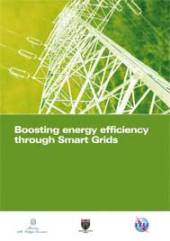|
This report is part of ITU-T’s activities on ICT and Climate Change and has been commissioned by ITU in support of “International Year for Sustainable Energy for All”.
This report discusses the role of ICT in the smart grid with a view of energy efficiency, with the ultimate goal of hindering climate changes. This is done by starting from the consideration that ICT equipment consumes energy too, and this extra energy consumption could be quite significant. This leads to the conclusion that any ICT architectural choice and any implementation should focus first on its own efficiency.
From the energy efficiency perspective, the deployment of additional communication infrastructures for smart grids should carefully consider the trade-off between the gain in terms of energy saving and the cost of the operating devices. It should also avoid the risk to pose an unnecessary energy burden to end-customers, as they are expected to be bearing most of it. This report also underlines that the risk of having an ICT infrastructure with a negative energy efficiency balance often comes from the “scale” factor: this means small and low-power devices (a few watts) may have a huge energy footprint when they are massively deployed (electrical grids have billions of customers).
This report also gives a brief understanding about the possible path toward a “green” ICT, which is the implementation of power-aware and conscious devices for communication and information management. Indeed, any roadmap toward the deployment of ICT devices and networks in support of the smart grid should take into account (and leverage on) the existence of different networking solutions from the telecommunication perspective, each with different characteristics in terms of their own capabilities, coverage extension, numerousness, services’ suitability, and energy footprint. There is clearly no single communication platform that could efficiently fit all the different constraints and implementations of Smart Grids (SGs). The broad choice among the technologies and networks available will enable the most efficient, early, and economically viable implementation of SGs.
This report was researched and written by Franco Davoli, Matteo Repetto (University of Genoa, Italy) Carlo Tornelli, Gianluigi Proserpio (RSE, Milan, Italy) and Flavio Cucchietti (Telecom Italia).
Newslog, 20 September 2012
 |
|
(September 2012)
|
Download report
here. |
|
Useful links:
|



